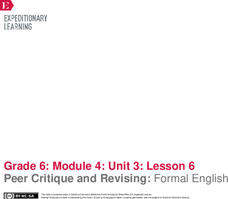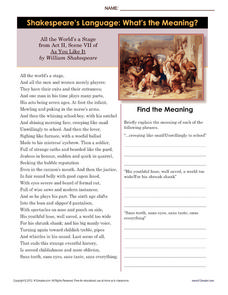ReadWriteThink
Style-Shifting: Examining and Using Formal and Informal Language Styles
Your high schoolers are probably versed in two languages: formal language, and informal conversation. Help them identify the correct language style for their audience and context with a thorough lesson and examples of different speech...
EngageNY
Peer Critique and Revising: Formal English
Dear Sir or Madam: What's the difference between formal and informal language? Scholars focus on using formal English and transitions in their position papers. After revising their rough drafts, they engage in the peer editing process...
Curated OER
Formal and Informal Language
Words carry connotative baggage and some suitcases are bigger than others. Learners consult the Chambers School Dictionary to identify the formal, informal or slang words used in a series of exercises.
Curated OER
Formal and Informal Language Resources
Yo! Check it out. Here's a lesson on formal and informal language. And the packet includes a game. What fun!
Curated OER
Create a Community that Promotes Academic Language
Set your elementary, middle, and high schoolers up for success by implementing a variety of strategies to build academic language.
Curated OER
Diction: Formal and Informal Language
Coke or Pepsi? Is it the taste or the advertising that determines preference? As part of a study of diction, class members examine two passages, one formal and one informal, about Coca-Cola and Pepsi. In addition, they consider word...
Curated OER
Formal Commands (Mandatos)
How do you give a formal command in Spanish? Study the charts provided and complete the practice below. This resource is easy to follow and gives learners organized information for easy recall.
Curated OER
Letter Writing - Formal
Although rarely used these days, letter writing is still a form of writing reviewed in schools. After examining written letters, middle schoolers discuss characteristics of a formal letter and its parts. They choose a famous person to...
EngageNY
Summarizing Complex Ideas: Comparing the Original UDHR and the "Plain Language" Version
The eighth lesson plan in this series continues the focus on vocabulary and increasing young readers' awareness of academic language. Pairs of learners participate in a short vocabulary review activity called Interactive Words in which...
BBC
Recognizing Formal and Informal Language
When do you need to use formal language, and when is it cool to speak informally? Read these sentences and use a grid to help decide. This clever tool is followed by ten sample sentences to identify as formal or informal, perfect for...
EngageNY
End of Unit Assessment: Presentation of Position
What is the difference between formal and informal language? Pupils rewrite their position speeches to adapt them for an audience of adults. Next, they present their speeches in small groups, attempting to answer the question, "Which...
Curated OER
Formal versus Informal Language
Engage in an activity that focuses on the concepts of formal and informal language use. Middle and high schoolers compare and contrast each style by using a Venn diagram that includes some examples. They read and hear a passage of lyrics...
Curated OER
From Formal To Slang
Tenth graders define the term slang, explaining its various social, historical, and racial contexts, so as to articulate when it can be appropriately used as a means of effective communication. They use their own personal slang lexicon,...
One Stop English
A Lesson on Register
The classroom might not be the best place for informal language, but it's a great place to teach middle and high schoolers how to identify the correct language register for their audience. A short lesson on formal and informal language...
English Enhanced Scope and Sequence
Differentiate between Formal and Informal Language
The Pledge of Allegiance, the Gettysburg Address, the National Anthem, and the Preamble to the Constitution all get close attention in an exercise that asks learners to rewrite these formally-worded documents into informal language....
Curated OER
Writing Formal Letters
Help your young writers recognize the importance of composing formal letters. Middle schoolers read letters written by Thomas Jefferson and analyze the components that make it a formal letter. They will then compose their own letters.
Curated OER
Understanding the Poem
Practice literary analysis with your poetry pupils using the mysterious narrative poem "The Listeners." They examine the archaic language and answer 12 comprehension and analysis prompts. Foster creativity with these referential...
K12 Reader
Shakespeare's Language: What's the Meaning?
You needn't be an actor to stage this exercise in reading comprehension. Kids examine Jacques's "All the World's a Stage" speech from Act II, scene ii, of As You Like It, and explain the literal meaning of the figurative language. There...
Curated OER
Irregular Formal Commands (Mandatos)
How do you form irregular formal commands in Spanish? Now that your class has learned how to form the Ud. and Uds. commands, review some of the irregular formal commands. First encourage learners to study the charts at the top of the...
Curated OER
Languages in Contact, Socio-spatial Diversity: Language Varieties
Spend some time considering the functions and types of language such as vernacular, standard, and pidgin. This lengthy presentation would benefit a college-level linguistics course with its accurate descriptions and plenty of examples....
Curated OER
Teaching Debate to ESL Students
Language learners use the debate format to practice formulating, expressing, and defending their ideas. Working in teams, class members develop resolutions, use opinion indicators to express their opinions and reasons, and prepare...
Curated OER
Irregular Formal Commands
After learning the regular formal commands for the Spanish language, your linguists should learn the irregular formal commands. First, they complete the chart with select irregular verbs like ir, caber, and caer. Then, in the second...
Curated OER
Formal Commands (Mandatos)
How do you give commands in Spanish? Use this well-organized resource to review formal commands. Extend the activity by having pairs write a dialogue between a mother or father and a small child in a candy store.
EngageNY
Grade 10 ELA Module 3: Unit 3, Lesson 8
All is fair in claims and counterclaims. Scholars continue to work on their argumentative writing pieces by ensuring their papers fairly address claims and counterclaims. Writers review the importance of argumentative writing conventions...
Other popular searches
- Informal vs Formal Language
- Informal and Formal Language
- Casual and Formal Language
- What Is Formal Language
- Impersonal Formal Language
- Formal Language Letters
- English Formal Language
- Lesson Plans Formal Language
- Informal vs. Formal Language
- Causal and Formal Language

























